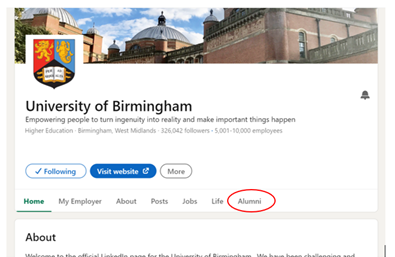In this post, Alice Kinghorn, PGR External Engagement Project Officer in Careers Network, shares her tips for engaging with employers outside of academia to gain insights into different careers, develop key skills, and build your network.
Engaging with employers outside of academia during your PhD can be daunting. Whether this be through an internship, attending careers event, or building informal relationships with employers, many PhD students have reservations. Perhaps you are concerned about your supervisor’s support in seeking a career beyond academia, or maybe you’re worried about the time needed to build a professional profile.
There are, however, an increasing range of external engagement opportunities (to meet, interact, and develop relationships with employers) that don’t require the time commitment of an intense work-placement or internship. This blogpost explores two ways to do this: building a professional network through LinkedIn, and attending events with external employers. Both are useful ways to gain insights into non-academic careers and to develop professional skillsets.

Have a Conversation with your Supervisor
You may be worried about your supervisor’s response if you want to explore opportunities beyond academia, either because they want you to stay in academia, or because they are concerned about time away from your studies. However, recent research at the Universities of York and Sheffield have shown that supervisors of PhD students who undertake external engagement opportunities appreciated the valuable skills they had gained. These included professionalism, adaptability, confidence, and interpersonal skills.
External engagement and support from employers does not replace your academic supervisors. Instead, it can provide critical insights into the world beyond academia. Consider explaining to your supervisor that you are interested in exploring career opportunities. They may even share employer and industry contacts with you.
Use LinkedIn to Grow your Network
LinkedIn is a great tool to grow your network in sectors you are interested in outside of academia without having to dedicate time to attending an event. A good starting point is to see where alumni in your research field are currently working:
- Head to the University of Birmingham’s LinkedIn page
- Click ‘Alumni’
- Search ‘PhD’
- Filter your subject in ‘What they studied’
Scroll down to start viewing search results. Where do alumni work now? Where have they worked? Are there any fields you are interested in?
Ask to connect with people in your field of interest. In your message, explain who you are, and why you would like to connect. What insights would you like to gain? Why do you think the connection is worthwhile? Growing your professional network this way is quick and easy, allowing you to keep up-to-date in sectors of interest.
Attend Employer-led Events
A further straightforward introduction to external engagement is through events organised by the postgraduate team at Careers Network. Here, you can learn how to draw on transferable skills, key differences working within and beyond academia, and how develop your professional skillset.
For example, engaging with employers requires a different skillset than talking to an expert academic audience about your research. Can you think instead about the skills gained during your research? Project management, problem solving, data analysis, presentation, and interpersonal skills are just some of those that you will already possess. Employer led discussions increase your exposure to external engagement whilst highlighting skills that employers are looking for, how to talk about these skills in interview, and how to develop them during your studies.
To further develop your skillset through employer led events, sign up to the PG Skills Canvas Course. See the latest events on the University Graduate School Events page.


